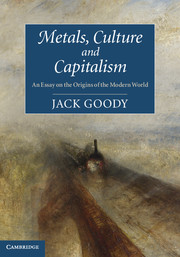Book contents
- Frontmatter
- Contents
- Maps
- Plates
- Preface
- Acknowledgements
- Chronology
- Part I Explorers
- Part II Merchants
- 7 ‘Capitalism’, exchange and the Near East
- 8 China and the Eurasian corridor
- 9 Renewal in the west
- 10 Venice and the north
- Part III Accumulators
- Appendix 1 The metallurgy of iron
- Appendix 2 Damascene steel and blades
- Glossary (with the aid of J. A. Charles)
- Bibliography
- Index
- Plate section
7 - ‘Capitalism’, exchange and the Near East
Published online by Cambridge University Press: 05 June 2014
- Frontmatter
- Contents
- Maps
- Plates
- Preface
- Acknowledgements
- Chronology
- Part I Explorers
- Part II Merchants
- 7 ‘Capitalism’, exchange and the Near East
- 8 China and the Eurasian corridor
- 9 Renewal in the west
- 10 Venice and the north
- Part III Accumulators
- Appendix 1 The metallurgy of iron
- Appendix 2 Damascene steel and blades
- Glossary (with the aid of J. A. Charles)
- Bibliography
- Index
- Plate section
Summary
By the twelfth century the supply of silver in Asia was largely exhausted, and the metal was then exploited once again in the north of Europe, in England, France and in Germany, much being shipped to the Near East through the port of Venice which, as we have seen, was so heavily involved in this trade. This independent republic had maintained and developed ties with both the Muslim and Christian worlds to the east. The main flow of metals, as of wood and of wool, was from west to east, to pay for the spices, silks and valuables once again coming from India and the Arab lands. Between 1170 and 1220 the situation changed somewhat and in Europe precious metals were mined further west, and closer to the Venetian republic that exported them. A rich lode of silver was discovered at Freiburg in Saxony and started ‘a frenetic search for new mines’; with their expertise in metals, transmitted since before the Hallstatt period, Saxon miners went through Bohemia and Hungary to the Carpathians and yet further east. For Venice in their eastern trade, metals from Central Europe were as important as western woollens. For her ‘rise to commercial prominence in the thirteenth century was based not only on the growth of its trade in goods created by the Venetians but also on the growth of metal production in Europe, an achievement not of Venetians but of German miners and merchants’. Germany and its sphere of influence was of the greatest importance. Despite all their activity, little technological progress seemed to have been made, but some have said the same for the Romans. Some change certainly took place in the medieval period; especially in Central Europe where the concepts of ‘Saxon’ and ‘miner’ became almost equivalent. These men began mining in Hungary in Transylvania (where they are known as Szászok, or Saşi in Romanian), at Schemnitz as early as 745, and in the Harz by 970; much later, in 1551, 200 miners were sent to Spain to reopen the mines in Seville, and in 1624 in Konigsberg the Norwegian king put out a call for miners from Germany. In the Tudor period, and before, the English crown did the same. The Germans were the recognised specialists in metallurgy throughout Europe.
- Type
- Chapter
- Information
- Metals, Culture and CapitalismAn Essay on the Origins of the Modern World, pp. 139 - 152Publisher: Cambridge University PressPrint publication year: 2012



